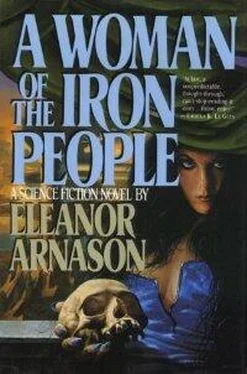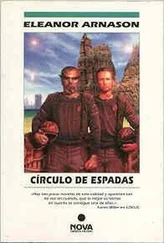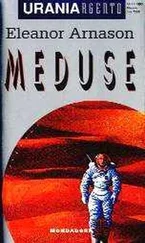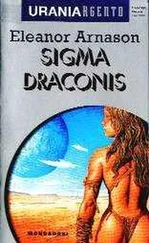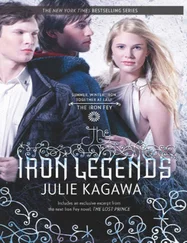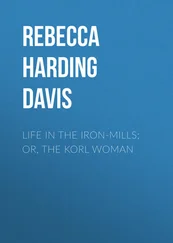He mounted his animal and gathered the reins. He looked down at Nia. “I used to think that nothing frightened me except old age. But the village back there frightened me.” He waved toward the west and south. “I’m angry with myself and restless. I’d better get going.” He tugged on the reins. The animal turned. Inzara glanced back. “Maybe I will come again in the spring. Or maybe Ara will come. The village won’t frighten him. And Tzoon is like a rock. Nothing ever bothers him.”
He rode off. Nia put the necklace on. It was fine work. The amber was shaped into round beads, and the fish was made of tiny pieces of gold, fastened together. It wiggled like a real fish.
She walked back to camp.
The next day snow fell: large, soft flakes that melted as soon as they touched the ground. She packed her belongings and cleaned the house. She left a bag of dried food hanging from the roof pole. People might come. They might be hungry. She left a cooking pot, a jug for water, and a knife.
After that she took a good look at the bowhorns. Their hooves were healthy. There were no sores on their backs. They walked without favoring any foot or leg. Their eyes were clear. So were their nostrils. She found no evidence of worms or digging bugs.
Nia made the gesture of satisfaction.
Her hands were not entirely empty. She had three animals and food and the metal-working tools, which Tanajin had left. It was more than she had taken from the village of the Copper People. More than she had taken from her own village when she left the first time or the second time or the third.
The next day she crossed the river. She had to make two trips. The first one was easy. The air was still. The sky was low and gray, but nothing came out of it. She took two of the bowhorns and tied them on the western shore, then went back.
She loaded the rest of her belongings and led the third bowhorn onto the raft. It snorted and stamped a foot.
“Be patient! Be easy! The others gave me no trouble.”
She pushed off. Snow began to fall. The flakes were big and soft. They drifted down slowly. By the time she reached the first island the eastern shore was gone, hidden by whiteness. She crossed the island and loaded everything onto the second raft.
The snow was staying this time, sticking to bare branches, sticking to the gear the bowhorn carried: the bags and blankets. There was snow on Nia’s shoulders and snow on the rough bark of the logs that made up the raft. All around her flakes of snow touched the gray surface of the river and vanished.
Aiya! The whiteness! It hid the island she had just left, and she could not see the island that was her destination. Nia swung the paddle and grunted.
They landed at the far southern end of the island. Nia pulled the raft up on land, then looked at it. She ought to bring it upriver to the proper landing place. But that would take time, and the storm was getting worse.
“Let others deal with this problem,” she said.
She led her animal across the island to the final raft.
That crossing was easier. The channel was narrow. But the snow kept getting thicker. It covered the raft and the bowhorn and Nia. Even the paddle was covered with snow. When she lifted it and swung it, pieces of snow fell off. They made noises when they hit the water.
A poem came to Nia. She didn’t know if she’d learned it as a child or made it up right here in the middle of the river.
Why do you come,
oh, why do you come now,
O people of the snow?
People in white shoes,
why do you bother me?
She reached the western shore and led the bowhorn off, praising it for good manners. It snorted and flicked its ears.
“I know. I know. You wanted to make trouble. But you held yourself in check. That’s worth praising. It’s over now.” She looked at the river: the gray water and the falling snow. “We’ll pull the raft up onto land, and then we will go and find your companions. And in the morning we’ll go south.”
A note on pronunciation
I was raised on the Wade-Giles system of transliterating Chinese, but have converted to Pinyin in this novel.
Lixia is pronounced Lee-sha .
Yunqi is pronounced Yoon-chee .
The word zi, which means “sage,” is pronounced zee.
Zhuang Zi ( Chuang-tzu in the old system) is pronounced Juang-zee .
The rest of the Chinese names are pronounced approximately the way they look.
The native i, like the Pinyin i, is long.
The native a is usually pronounced ah as in father.
Nia is pronounced Nee-ah .
In is pronounced inn .
Ar is pronounced as in car and far.
Inzara is pronounced Innzarah .
Ai is pronounced as in hay.
U is pronounced oo .
Nahusai is pronounced Nahoosay .
E is usually the vowel sound in air or care.
Gersu is pronounced Gairsoo .
O is the sound in Oh and Oklahoma.
Yohai is pronounced Yohay .
The sound spelled kh in the language of the Copper People is pronounced like the ch in Bach.
The natives all speak the language of gifts, but their pronunciation varies.
Nia can say g but not k. This is why her version of Derek’s name is Deragu. There is no sh in her language. Lixia becomes Li-sa. The oracle can say k and sh, but not p. The native animal that Nia calls osupa is osuba to him.
All the native languages are accented. Usually the accent falls on the first syllable.
There are three native gestures that could be translated as “yes.”
One is the gesture of affirmation, which means “yes, that is so.”
Another is the gesture of agreement, which means “yes, I agree with you.”
The third is the gesture of assent, which means “yes, that should, can, or will be done.”
Starship Design by Albert W. Kuhfeld, Ph.D.
For a reaction drive to push a ship near light-speed, the reaction mass itself must travel at relativistic velocities in a jet so hot no material substance can withstand it. Only a force field can handle the job.
Magnetic fields are the best-trained force fields we know: They’re used in laboratories everywhere to control the paths of charged particles. Nuclear fusion is nature’s way of making hot ions. A magnetic-mirror fusion reactor, with a leaky mirror to the aft, would create a rocketlike nuclear exhaust.
The reaction Li 7+ H 1= 2 He 4releases 17.3 MeV, with no neutral particles to carry off energy in random and uncontrollable directions. It’s one of the more enthusiastic reactions of starbirth—any technology with fusion power should be able to handle it.{Harwit, Martin, Astrophysical Concepts (New York: John Wiley Sons, 1973) pp. 335–43.}
Lithium hydride has a specific gravity of 0.78 and a melting point of 689 Celsius. Living quarters built inside a large chunk of this solid fuel are protected by sheer mass against most of the interstellar dust and gases. Hydrogen atoms make good shielding against neutrons, while magnetic fields steer away interstellar ions.
17.3 MeV e, evenly divided between the two product nuclei, works out to about 22% of the speed of light. The (nonrelativistic) equation for ship velocity is m dV + v edm = 0, which integrates out to V = v eln(m o/m).
Читать дальше
